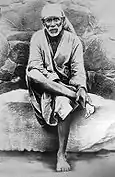
Sai Baba of Shirdi (unknown circa 1835 - October 15, 1918), also known as Shirdi Sai Baba, was an Indian guru, yogi and fakir who is regarded by his Hindu and Muslim followers as a saint. Some of his Hindu devotees believe that he was an incarnation of Shiva or Dattatreya, and he was regarded as a satguru and an incarnation of Kabir. The name 'Sai Baba' is a combination of Persian and Indian origin; Sāī (Sa'ih) is the Persian term for "holy one" or "saint", usually attributed to Islamic ascetics, whereas Bābā is a word meaning "father" used in Indian languages. The appellative thus refers to Sai Baba as being a "holy father" or "saintly father". His parentage, birth details, and life before the age of sixteen are obscure, which has led to a variety of speculations and theories attempting to explain Sai Baba's origins. In his life and teachings he tried to reconcile Hinduism and Islam: Sai Baba lived in a mosque, was buried in a Hindu temple, practised Hindu and Muslim rituals, and taught using words and figures that drew from both traditions. One of his well known epigrams says of God: "Sabka Malik Ek" ("One God governs all").